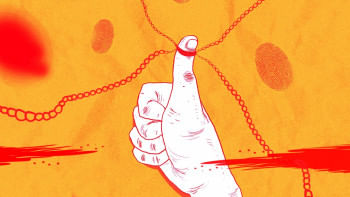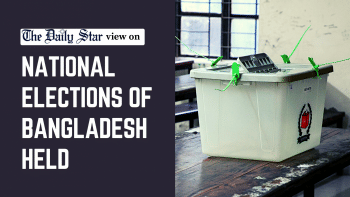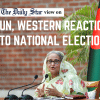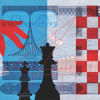A review of the 2024 electoral drama

Bangladesh has just witnessed yet another one-sided election, marked by low voter turnout, violence, and claims of rigged voting, after which the ruling Awami League (AL) is set to form a government for the fourth consecutive time with an absolute majority. The election was not at all participatory or competitive as AL's main political opposition party boycotted it, demanding election under a neutral, non-partisan government.
In this non-competitive election, AL-nominated candidates won 222 out of 298 seats while the independent candidates of AL won 62 seats. That is, the ruling AL alone got 284 seats—95 percent of the total seats. On the other hand, the main opposition in the current parliament, Jatiya Party (also known as the "domesticated opposition" party), won only 11 seats.
Although it was certain long before the election which party would form the government after the election, there was uncertainty about who would be the main opposition party. With Jatiya Party winning only 11 seats and AL independents winning 62 seats, there is talk that these independents could be made the main opposition party in parliament. In that case, it would mean one-party rule being established in the country.
Although it was certain long before the election which party would form the government after the election, there was uncertainty about who would be the main opposition party. With Jatiya Party winning only 11 seats and AL independents winning 62 seats, there is talk that these independents could be made the main opposition party in parliament. In that case, it would mean one-party rule being established in the country.
When the outcome of a game is already decided, spectators are usually not interested in going to the stadium. Similarly, people were not interested in voting as they already knew the result of the staged election. So, the main challenge for the ruling party was to bring voters to the polling stations. For this end, AL took many initiatives which included encouraging voters to go to the polling centres by providing free rickshaw services, and even threatening to discontinue the social security benefits if people did not vote. But judging by the voter turnout rate, it cannot be said that these initiatives have been entirely successful.
The Chief Election Commissioner claimed that around 40 percent votes were cast, but the credibility of this statistic has been questioned. Even if the information given by the Election Commission (EC) is considered correct, the fact that 13 percent votes were cast in the last one hour is not consistent with the voting trend that was seen throughout the day. According to the EC, the percentage of votes cast till 12:10pm was 18.5 percent. That is, the voting rate during the first four hours was 4.62 percent per hour. And the voter turnout till 3pm was 27.15 percent, according to EC secretary Jahangir Alam. This implied a voting rate of 3.87 per hour during the first seven hours. If this trend continued, then three to four percent of votes would have been cast in the last hour of January 7. But it was supposedly in the last hour that the trend seen throughout the entire day was broken and the voter turnout rate became a staggering 13 percent.
The daily New Age reported that, in many places, the activists for AL candidates massively stuffed ballots in the final hours of voting. For example, Bangladesh University of Textiles, a polling venue which accommodated five polling centres in Dhaka-12, was swarmed by some youths after 3pm. Police and Ansar members were sitting idle while the 20-something young men cast votes as they wished.
In order to create an illusion of large voter presence, fake lines of voters were formed by activists of the ruling party at various polling centres across the country, including in Dhaka. It has been reported that long queues were formed when television cameras, foreign observers, or important election officials arrived at the centres, which dispersed as soon as the observers left. Although there was not much crowding inside the polling stations, there were artificial gatherings outside them.
Meanwhile, the ruling party could not even ensure fair play between its own nominated and independent candidates. There was no chance of AL losing power in an election which was nothing but a constitutional formality. Even then, there were allegations that Awami League leaders and activists occupied the polling centres of their respective constituencies, drove out agents of other candidates, and cast fake votes—all while the local administration and police collaborated with them in rigging the election. There were also allegations of getting signatures of polling agents on the result sheet even before voting ended at some polling centres. In protest of these irregularities, 45 candidates boycotted the election, many of whom were leaders of the ruling party who'd contested as independent candidates, and some were even MPs in the current parliament. For example, Zafar Alam, an AL independent candidate of Cox's Bazar-1 constituency, who is the current MP of this constituency, quit the election alleging vote rigging led by "BGB and an intelligence agency." In Jessore-1 (Sharsha) constituency, Ashraful Alam Liton, the joint general secretary of Jessore district Awami League and former mayor of Benapole Municipal Council, announced his boycott of the election by alleging that supporters of the AL candidate were stuffing ballots publicly, hurling crude bombs, and forced his 55 polling agents out of the polling centres.
Manowar Hossain Chowdhury, the current ruling party MP of Gaibandha-4 constituency and an independent candidate, alleged that Awami League-nominated candidate Abul Kalam Azad cast fake votes by occupying 91 of the 139 centres in the constituency.
In one centre of Narsingdi-4 constituency, 12 ballot books were found sealed in favour of the boat even before the election began at 8am. In Mymensingh-10 (Gafargaon) constituency, three persons (including the presiding officer of the centre) were arrested for stuffing ballots in favour of the boat. A number of votes in Cumilla's Chandina Upazila were cancelled after videos of already stamped ballot papers emerged from the Chandina and Debidar polling centres. These videos were widely circulated on social media.
The fact that a fair and impartial election is not possible under the ruling party's government has become clear once again due to the irregularities which took place even in an election lacking real competition. If the AL independents and allies themselves have become victims of such irregularities and vote fraud, it should not be difficult to gauge what actual opposition rivals would have to deal with in a truly competitive election.
Kallol Mustafa is an engineer and writer who focuses on power, energy, environment and development economics.
Views expressed in this article are the author's own.
Follow The Daily Star Opinion on Facebook for the latest opinions, commentaries and analyses by experts and professionals. To contribute your article or letter to The Daily Star Opinion, see our guidelines for submission

 For all latest news, follow The Daily Star's Google News channel.
For all latest news, follow The Daily Star's Google News channel. 










Comments